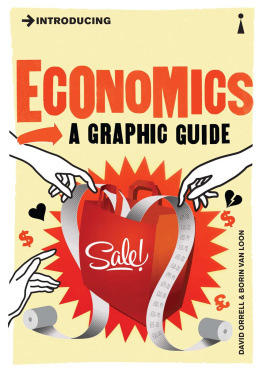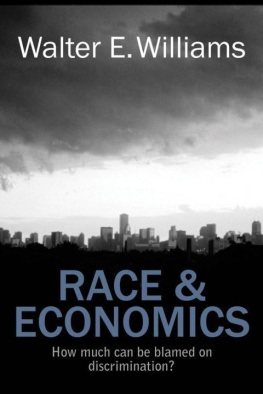Card David - Myth and Measurement The New Economics of the Minimum Wage
Here you can read online Card David - Myth and Measurement The New Economics of the Minimum Wage full text of the book (entire story) in english for free. Download pdf and epub, get meaning, cover and reviews about this ebook. City: Princeton;United States, year: 2016;2015, publisher: Princeton University Press, genre: Politics. Description of the work, (preface) as well as reviews are available. Best literature library LitArk.com created for fans of good reading and offers a wide selection of genres:
Romance novel
Science fiction
Adventure
Detective
Science
History
Home and family
Prose
Art
Politics
Computer
Non-fiction
Religion
Business
Children
Humor
Choose a favorite category and find really read worthwhile books. Enjoy immersion in the world of imagination, feel the emotions of the characters or learn something new for yourself, make an fascinating discovery.
- Book:Myth and Measurement The New Economics of the Minimum Wage
- Author:
- Publisher:Princeton University Press
- Genre:
- Year:2016;2015
- City:Princeton;United States
- Rating:4 / 5
- Favourites:Add to favourites
- Your mark:
- 80
- 1
- 2
- 3
- 4
- 5
Myth and Measurement The New Economics of the Minimum Wage: summary, description and annotation
We offer to read an annotation, description, summary or preface (depends on what the author of the book "Myth and Measurement The New Economics of the Minimum Wage" wrote himself). If you haven't found the necessary information about the book — write in the comments, we will try to find it.
Card David: author's other books
Who wrote Myth and Measurement The New Economics of the Minimum Wage? Find out the surname, the name of the author of the book and a list of all author's works by series.
Myth and Measurement The New Economics of the Minimum Wage — read online for free the complete book (whole text) full work
Below is the text of the book, divided by pages. System saving the place of the last page read, allows you to conveniently read the book "Myth and Measurement The New Economics of the Minimum Wage" online for free, without having to search again every time where you left off. Put a bookmark, and you can go to the page where you finished reading at any time.
Font size:
Interval:
Bookmark:

Myth and Measurement:
The New Economics of the Minimum Wage
Myth and Measurement
THE NEW ECONOMICS OF THE MINIMUM WAGE
David Card and Alan B. Krueger
TWENTIETH-ANNIVERSARY EDITION
With a new preface by the authors
PRINCETON UNIVERSITY PRESS
PRINCETON AND OXFORD
Copyright 1995 by Princeton University Press
Preface to the Twentieth-Anniversary Edition 2016 by Princeton University Press
Published by Princeton University Press, 41 William Street,
Princeton, New Jersey 08540
In the United Kingdom: Princeton University Press, 6 Oxford Street, Woodstock,
Oxfordshire OX20 1TW
All Rights Reserved
Grateful acknowledgment is made to the American Economic Review for their permission to reprint portions of the authors previously published work.
Grateful acknowledgment is made to the Industrial and Labor Relations Review for their permission to reprint portions of the authors work previously published in vol. 6, no. 1, pp. 621; vol. 46, no. 1, pp. 2337 and 3854; and vol. 47, no. 3, pp. 48796.
Grateful acknowledgment is made to Research in Labor Economics for their permission to reprint portions of the authors previously published work.
First Twentieth-Anniversary Edition Printing, 2016
Paperback ISBN: 978-0-691-16912-5
Library of Congress Control Number: 2015954507
This book has been composed in Palatino.
Princeton University Press books are printed on acid-free paper and meet the guidelines for permanence and durability of the Committee on Production Guidelines for Book Longevity of the Council on Library Resources
Printed in the United States of America
10 9 8 7 6 5 4 3 2 1
Dedicated to Richard Allen Lesterour colleague and friend
Contents
CHAPTER 1 |
CHAPTER 2 |
CHAPTER 3 |
CHAPTER 4 |
CHAPTER 5 |
CHAPTER 6 |
CHAPTER 7 |
CHAPTER 8 |
CHAPTER 9 |
CHAPTER 10 |
CHAPTER 11 |
CHAPTER 12 |
Preface to the Twentieth-Anniversary Edition
The field of economics was on the cusp of major change when the first edition of Myth and Measurement: The New Economics of the Minimum Wage was published two decades ago. In the 1980s, fewer than 40 percent of articles in top economics journals contained any empirical analysis. By 2011, that figure had grown to 72 percent. More importantly, the role of empirical analysis in economics was also changing. In many articles published in the 1970s and 1980s the empirical analysis was clearly secondary to the main theoretical point of the paper, intended to confirm a basic prediction of the theory, or derive estimates of some key parameters under the assumption that the theory was correct. Rarely was the empirical analysis designed to provide a test of the underlying economic model; even less often was the test designed with an eye toward convincing a skeptical observer.
The nature of empirical work in economics began to change dramatically in the late 1980s and early 1990s with what Angrist and Pischke (2010) have called the credibility revolution in empirical economics, which emphasized rigorous research designs closely linked to the ideal of a randomized experiment and elevated empirical analysis to a far more central role in the field.
The history of research on the minimum wage exemplifies, and in many ways presages, this evolution. Prior to our work on the minimum wage in the early 1990s, the vast majority of empirical research on the minimum wage was based on nationwide time-series analyses of teenage employment. In these studies the share of teenagers employed in a particular year or quarter was related to a measure of the minimum wage relative to the average wage (often adjusted for coverage of the minimum wage) and other factors. In essence, these studies examined whether teenage employment was relatively high in periods when the minimum wage was relatively low. A consensus emerged in the late 1970s that a 10 percent minimum wage increase was associated with a 1 to 3 percent decline in teen employment. But then a funny thing happened. As more years of data became available and were added to this type of analysis, economists found that the estimated effect of the minimum wage became smaller, the statistical precision of the estimated minimum wage effect became weaker, and one could no longer conclude that the minimum wage had a statistically detectable relationship with teenage employment. The reason for this breakdown was clear: the value of the minimum wage was fixed at $3.35 per hour from January 1981 until April 1990, so its relative value declined precipitously, yet the teenage employment rate hardly changed.
This is around the time when we entered the picture. Frankly, we were always skeptical of evidence based on comparisons of national time-series data without any explicit comparison or control group. Many unmeasured factors change from year to year, making it very difficult to attribute movements in teenage employment to the minimum wage. Moreover, federal minimum wage increases arise from a political process that is not totally immune to economic considerations. There was also a surprising lack of attention in the literature to the effect of minimum wages on wages, despite the presumption that the employment effects work through wages. Lastly, some of the econometric specifications appeared to be so finely honed to produce an adverse effect of the minimum wage that even small changes in the environment were likely to render the estimated effect statistically insignificant, and this is what happened.
Dissatisfied with the existing approach, we set out to identify natural experiments that would provide more persuasive evidence on the employment effects of the minimum wage. The most famous of our studies, summarized in of this book, compared employment in fast food restaurants in New Jersey and eastern Pennsylvania before and after New Jersey raised its state minimum wage from $4.25 to $5.05 dollars an hour (or from about $7.25 to $8.60 in todays dollars). Although this studys finding has received the lions share of attention, the reason we wrote Myth and Measurement was to emphasize the wide range of findings from different types of comparisons that were inconsistent with the hypothesis that minimum wage increases necessarily reduce employment. For example, we compared employment growth rates among New Jersey restaurants that were paying low and high wages prior to the states minimum wage increase. The high-wage restaurants were unconstrained by the minimum wage increase since they already satisfied the new requirement, thus forming a comparison group for the low-wage restaurants, which were forced to raise pay to comply with the law. Yet we did not find evidence of slower job growth at the low-wage restaurants.
Next pageFont size:
Interval:
Bookmark:
Similar books «Myth and Measurement The New Economics of the Minimum Wage»
Look at similar books to Myth and Measurement The New Economics of the Minimum Wage. We have selected literature similar in name and meaning in the hope of providing readers with more options to find new, interesting, not yet read works.
Discussion, reviews of the book Myth and Measurement The New Economics of the Minimum Wage and just readers' own opinions. Leave your comments, write what you think about the work, its meaning or the main characters. Specify what exactly you liked and what you didn't like, and why you think so.

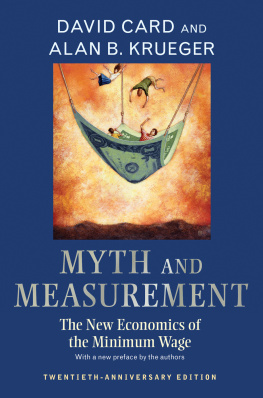
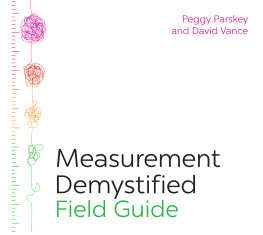

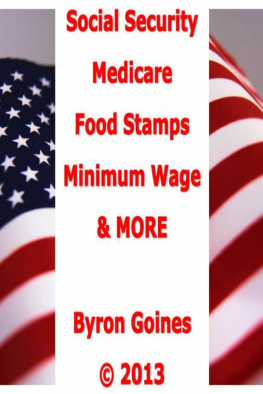
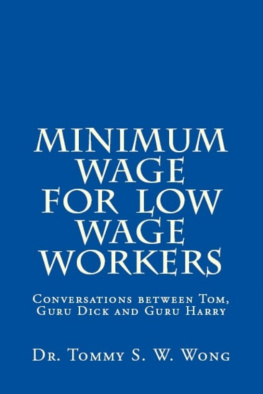
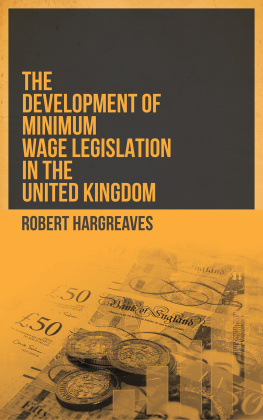

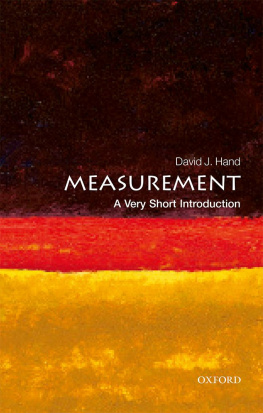
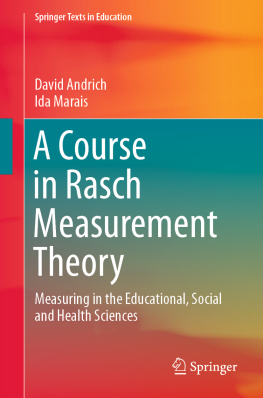
![David Orrell [David Orrell] - Quantum Economics](/uploads/posts/book/114631/thumbs/david-orrell-david-orrell-quantum-economics.jpg)
